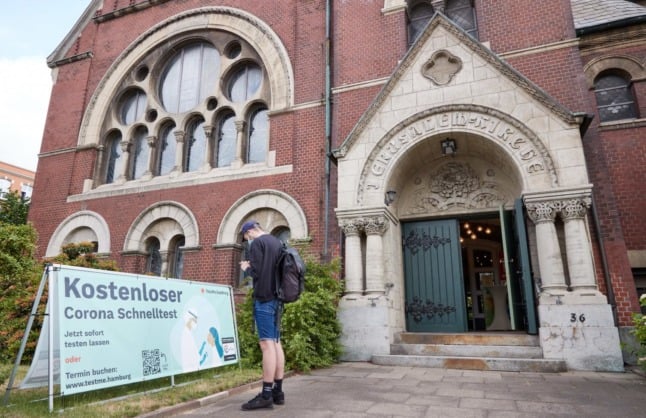What’s happening with tests?
To access certain activities across Germany – such as events, dining indoors, going to a club or the gym – people need to show proof of vaccination, recovery from Covid-19 or a recent negative test.
At the moment there is a large network of free Bürgertest (citizen tests) across Germany that mean anyone who isn’t vaccinated yet – or doesn’t plan to get the jab – can get tested easily.
But this could change in future when everyone has had the chance to be fully vaccinated.
That’s because the government is not ruling out charging for tests in the long run, reported Spiegel on Wednesday. It would serve as an incentive for people to get vaccinated.
READ ALSO:
- Schnelltests: Did rapid tests help bring Germany’s Covid-19 cases under control?
- How can tourists and visitors in Germany get a Covid-19 test?
So what is the government saying about tests?
During a press conference on Tuesday on the Covid situation, Health Minister Jens Spahn said Germany was still in the phase of urging people to get their jab. But he said in a later phase, the government may think about charging people to get Covid tests.
The President of the Robert Koch Institute (RKI), Lothar Wieler added: “For Germany, I don’t see that (charging for tests) happening yet, but I also don’t want to rule out the possibility of that situation happening one day.”
During the same press conference Chancellor Angela Merkel added that at the moment there are still groups who cannot be vaccinated, such as children or people who may have other reasons why they can’t get jabbed yet.
Measures that are “indirectly compulsory vaccination” must be carefully considered, she said. In the next few weeks, the focus will be on advertising vaccinations, “and then we will discuss further”, said Merkel.
READ ALSO: Schnell vs Selbst: The key differences between Germany’s new Covid-19 tests
Bavaria’s state premier Markus Söder said he is open to charging people for rapid Covid tests in future.
“Testing costs enormous sums of money,” said Söder. So Germany needs to consider whether the rapid tests can remain free of charge after everyone has been offered the vaccination, he added.
If the rules changed, this would not affect free PCR tests that people can receive if they have Covid-19 symptoms and at the discretion of a doctor.
People in Germany already have to pay for PCR tests if they have no symptoms. A PCR test can, for instance, be needed for travel to some countries abroad.
What about compulsory vaccines?
Unlike some other countries including France, Germany has so far rejected the idea of compulsory vaccinations for certain groups of people such as healthcare workers.
Chancellor Merkel said on Tuesday: “We do not intend to go down this road. We are at the beginning of the phase in which we are still promoting (vaccination), where we have more vaccines than we have people who want to be vaccinated.”
READ ALSO: Germany not planning compulsory vaccinations, says Merkel
Baden-Württemberg’s health minister Manne Lucha, on the other hand, strikes a different tone. The Green politician doesn’t think the country should rule out compulsory jabs for certain occupational groups and restrictions for non-vaccinated people.
“A profession-specific vaccination obligation can be discussed,” said Lucha. He said that the vaccination rate for assistants and semi-skilled workers in inpatient care facilities is currently relatively low.
The southern state is trying to work with the providers of these facilities to try and increase jab take-up, said Lucha.
In principle, the aim is still to motivate people to get vaccinated, said Lucha. But if that doesn’t work in the coming weeks, discussions will have to be held to show that “participation in social life is only possible for those who have been vaccinated”, he added.



 Please whitelist us to continue reading.
Please whitelist us to continue reading.
Member comments